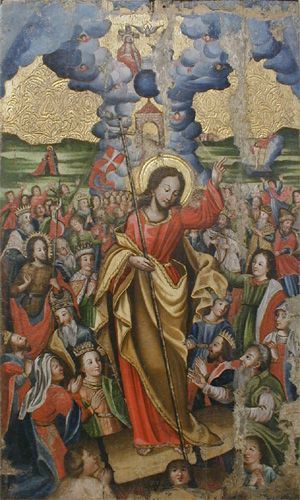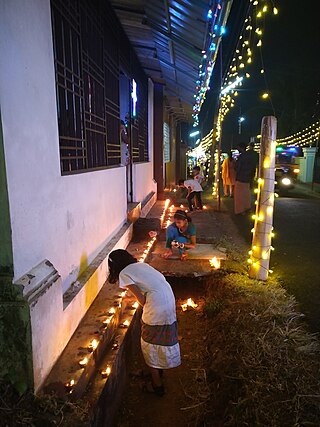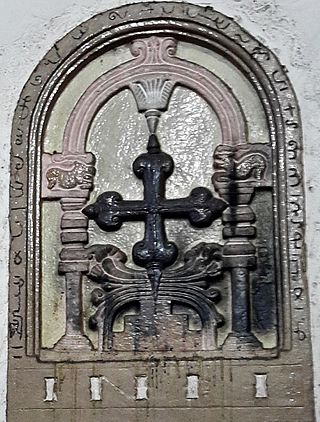The liturgical year, also called the church year, Christian year, ecclesiastical calendar, or kalendar, consists of the cycle of liturgical days and seasons that determines when feast days, including celebrations of saints, are to be observed, and which portions of scripture are to be read.

The Syro-Malabar Church, also known as the Syro-Malabar Catholic Church, is an Eastern Catholic church based in Kerala, India. It is a sui iuris (autonomous) particular church in full communion with the Holy See and the worldwide Catholic Church, with self-governance under the Code of Canons of the Eastern Churches (CCEO). The major archbishop presides over the entire church. The incumbent Major Archbishop is Raphael Thattil, serving since January 2024. It is the largest Syriac Christian church and the largest Eastern Catholic church. Syro-Malabar is a prefix reflecting the church's use of the East Syriac liturgy and origins in Malabar. The name has been in usage in official Vatican documents since the nineteenth century.

Eastertide or Paschaltide is a festal season in the liturgical year of Christianity that focuses on celebrating the Resurrection of Jesus Christ. Preceded by Lent, it begins on Easter Sunday, which initiates Easter Week in Western Christianity, and Bright Week in Eastern Christianity.

The Holy Qurbana, refers to the Eucharistic liturgy as celebrated in Syriac Christianity and the liturgical books containing the rubrics for its celebration. Churches that celebrate this liturgy include various descendants of the Church of the East. East Syriac Christianity consists of an Edessan liturgical rite called the East Syriac Rite. The major anaphora of the East Syriac tradition is the Holy Qurbana of Saints Addai and Mari; Addai being a disciple of Thomas the Apostle and Mari being Addai's disciple. These churches are primarily based in the Middle East and India, with diasporic communities settled in the western world.

The Epiphany season, also known as Epiphanytide or the time of Sundays after Epiphany, is a liturgical period, celebrated by many Christian Churches, which immediately follows the Christmas season. It begins on Epiphany Day, and ends at various points as defined by those denominations. The typical liturgical color for the day of Epiphany is white, and the typical color for Epiphany season is green.
Nones, also known as None ("Ninth"), the Ninth Hour, or the Midafternoon Prayer, is a fixed time of prayer of the Divine Office of almost all the traditional Christian liturgies. It consists mainly of psalms and is said around 3 pm (15:00), about the ninth hour after dawn.

The West Syriac Rite, also called the Syro-Antiochian Rite and the West Syrian Rite, is an Eastern Christian liturgical rite that employs the Divine Liturgy of Saint James in the West Syriac dialect. It is practised in the Maronite Church, the Syriac Orthodox Church, the Syriac Catholic Church and various Malankara Churches of India. It is one of two main liturgical rites of Syriac Christianity, the other being the East Syriac Rite. It originated in the ancient Patriarchate of Antioch. It has more anaphoras than any other rite.

The East Syriac Rite, or East Syrian Rite, is an Eastern Christian liturgical rite that employs the Divine Liturgy of Saints Addai and Mari and utilizes the East Syriac dialect as its liturgical language. It is one of the two main liturgical rites of Syriac Christianity, along with the West Syriac Rite.

Pindikuthi Perunnal or Rakkuli Perunnal is a traditional and important festival of Saint Thomas Christians celebrated on 6 January. Pindikuthi Perunnal is the Saint Thomas Christian counterpart of Denha in Eastern church and Epiphany in Western Church. The liturgical season Denha Kaalam begins with the Sunday nearest to Pindikuthi Perunnal.
The Fifth Sunday of Easter is the fifth Sunday of the Easter season, being four weeks after the Christian celebration of Easter Sunday. In Western Christianity, this day is also known as the Fourth Sunday after Easter or Cantate Sunday. Eastern Christianity also calls this day the "Fifth Sunday," but typically using an Eastern synonym for Easter; for example, Fifth Sunday of Holy Pascha or Fifth Sunday of the Resurrection. In the Byzantine Rite, this day is also known as the Sunday of the Samaritan Woman.

The Hallowing of Theodore of Mopsuestia is one of three Eucharistic liturgies used in the East Syriac Rite. It is currently employed by Assyrian Church of the East, Ancient Church of the East, the Syro-Malabar Church and to a lesser extend in the Chaldean Catholic Church, which are descendants of the erstwhile Church of the East. It is attributed to Theodore of Mopsuestia and is used from Advent until the Sunday of the Oshana.

A liturgical book, or service book, is a book published by the authority of a church body that contains the text and directions for the liturgy of its official religious services.
The Syro-Malabar Church is a Catholic Church sui iuris of the East Syriac Rite that adheres to the following calendar for the church's liturgical year. Like other liturgical calendars, the Syro-Malabar calendar loosely follows the sequence of pivotal events in the life of Jesus.
The Malankara Rite is the form of the West Syriac liturgical rite practiced by several churches of the Saint Thomas Christian community in Kerala, India. West Syriac liturgy was brought to India by the Syriac Orthodox Bishop of Jerusalem, Gregorios Abdal Jaleel, in 1665; in the following decades the Malankara Rite emerged as the liturgy of the Malankara Church, one of the two churches that evolved from the split in the Saint Thomas Christian community in the 17th century. Today it is practiced by the various churches that descend from the Malankara Church, namely the Malankara Orthodox Syrian Church, the Jacobite Syrian Christian Church, the Syro-Malankara Catholic Church, Malankara Mar Thoma Syrian Church, and the Malabar Independent Syrian Church.
The Season of Annunciation or Season of Announcements, is a liturgical season in Syriac Christianity. The name of the season is in reference to the Annunciation to the Blessed Virgin Mary, the announcement by the Archangel Gabriel to the Blessed Virgin Mary, that she would conceive and bear a son through a virgin birth and become the mother of Jesus Christ.

The Saint Thomas Christian denominations are Christian denominations from Kerala, India, which traditionally trace their ultimate origins to the evangelistic activity of Thomas the Apostle in the 1st century. They are also known as "Nasranis" as well. The Syriac term "Nasrani" is still used by St. Thomas Christians in Kerala. It is part of the Eastern Christianity institution.
The Season of Apostles is a liturgical season in East Syriac Christianity. The season begins with the feast of Pentecost and continues for seven weeks. The season starts on June 30 and the feast of the 12 apostles is on June 30. It also marks the half of a year according to the Gregorian Calendar. It is followed by the Season of Summer.

Pentecost season, also known Pentecostide, as well as the time of Sundays after Pentecost or Sundays after Trinity, is a liturgical period, celebrated by some Christian churches, which immediately follows the Easter season. Although the start and end dates vary by liturgical tradition, the season typically begins on the day of Pentecost and continues throughout the rest of the liturgical year, ending just before the season of Advent. The liturgical color for this period is typically green or red.

The Holy Qurobo or Holy Qurbono refers to the Eucharist as celebrated in Syro-Antiochene Rite and the liturgical books containing rubrics for its celebration. West Syriac Rite includes various descendants of the Oriental Orthodox and Eastern Catholic churches. It consists of two distinct liturgical traditions: the Maronite Rite, and the Jacobite Rite. The major Anaphora of both the traditions is the Divine Liturgy of Saint James in Syriac language. The Churches are primarily based in the Middle East, Africa, and India.
The Eastern Catholic Churches of the Catholic Church utilize liturgies originating in Eastern Christianity, distinguishing them from the majority of Catholic liturgies which are celebrated according to the Latin liturgical rites of the Latin Church. While some of these sui iuris churches use the same liturgical ritual families as other Eastern Catholic churches and Eastern churches not in full communion with Rome, each church retains the right to institute its own canonical norms, liturgical books, and practices for the ritual celebration of the Eucharist, other sacraments, and canonical hours.










